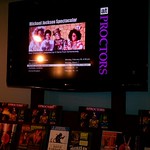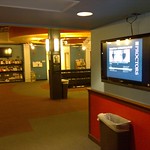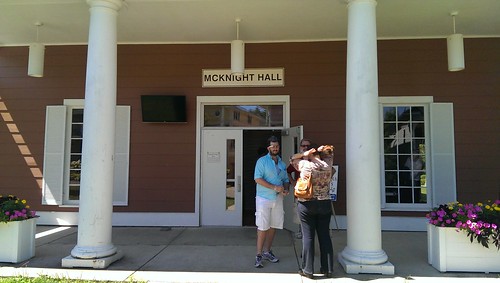Getting a Web Slideshow Kiosk on the lobby TV
Chromecast is a new invention by the boys down in Google R&D (think of saying that in an old timey radio announcer vocie). It'll revolutionize the intertelevisiontubes!
For quite some time now I've had an interest in kiosks that show event information from my big clients' website on a television. They are a big performing arts center and they have all of this great event information in their website. With "Proctors TV" we let them push pictures, videos, and sponsored advertising slides to 3 forty-or-fifty-inch screens in the lobby of their building. They can also run the slideshow on a big projector in their atrium. This has been a great tool for them, and much easier than baking out a video to a DVD or updating a crazy powerpoint slideshow, because it can update itself as events end and sell out, and the web master only has to make sure the information is up-to-date and accurate.
Originally, we used a Mac Mini in the server closet hooked up to a rasterizer box that would allow them to add the Proctors TV signal to their CCTV signal inside the building. Channel 1 shows what's happening back stage, Channel 2 shows the hallway to the dressing rooms, etc but one channel is dedicated to Proctors TV. This means all the TVs must show the same signal, but it's a really cool system.
Now another client is asking for a similar system, but they have multiple venues, and they really only want a few items pertaining to the local venue, not every event at all 12+ venues. The challenge becomes outfitting 10 or 12 of these TV displays on a bit of a budget. I've been researching different hardware options that will cheaply drive a display, and in my opinion the Logitech Revue or the VIZIO Co-Star
Google TV boxes are a really great option - especially because they run stand-alone, they can be plugged in to Ethernet, and they come with their own hardware keyboard for typing web addresses.
In the Google TV box, the web browser is the #1 feature that had been setting it apart from devices like the AppleTV and the Roku - neither of which is capable of running a simple web page, stand-alone, without my device having to be in the room at the same time.
However, at the Coworking space, we often hold videoconferences in addition to the slide show functionality, and there was not a fantastic way to get a video chat onto the big screen (let alone the projector) until now. We also thought about mounting a projector in the ceiling in the conference room, but then the question always became how to get content up there without an unsightly umbilical cord of wires coming out of the sky, as our conference room setup didn't really have a good place to run wires to the wall. The Chromecast comes to the rescue!
The big question became how to get a video chat on to the Chromecast - that meant it had to be browser-based. Any desktop computer running Chrome and the GoogleCast plugin could send the contents of a tab to the TV, but when we tried to launch a Google Hanout, it openend in a new window, and the button for Chromecast didn't appear.
I realized Web RTC would probably do the trick, as long as I only wanted to talk to one other person. We found a WebRTC demo on Google App Engine that was very promising, but Hangouts just has so many more features...
After asking the smart folks of the Internet, a gentleman named Tom suggested another Chrome plugin called Join Tabs that combined all your open windows, which re-started the hangout, but brought it in to the main window where the Chromecast button appears.
Not that these videos are the best made on the planet, but hopefully it gets the idea across that you can use the Chromecast and the Google Cast technology to create the all-in-one TV magic kiosk you've been praying for with a dumb TV, a few Chrome extensions and $35 for an HDMI stick.
I also want to plug a game in the Chrome store called Crimson: Steam Pirates that plays pretty well over the TV. The lag is too great to play only on the TV, but the interesting thing was that the sound only played back from the TV speakers as opposed to on both the browser and the TV. I had fun showing off this turn-based game to some friends while we explored the capabilities of the Chromecast.
If you consider that Google is touting the Chromebook Pixel as the only laptop most people need, I would say that a Chromecast stick should come standard with every unit they sell now.
Commenting on this Blog post is closed.



